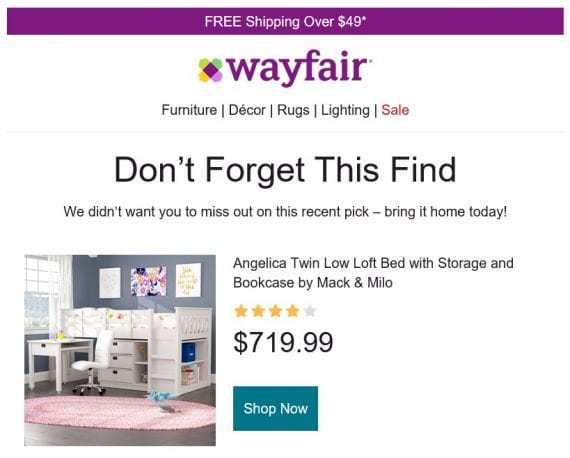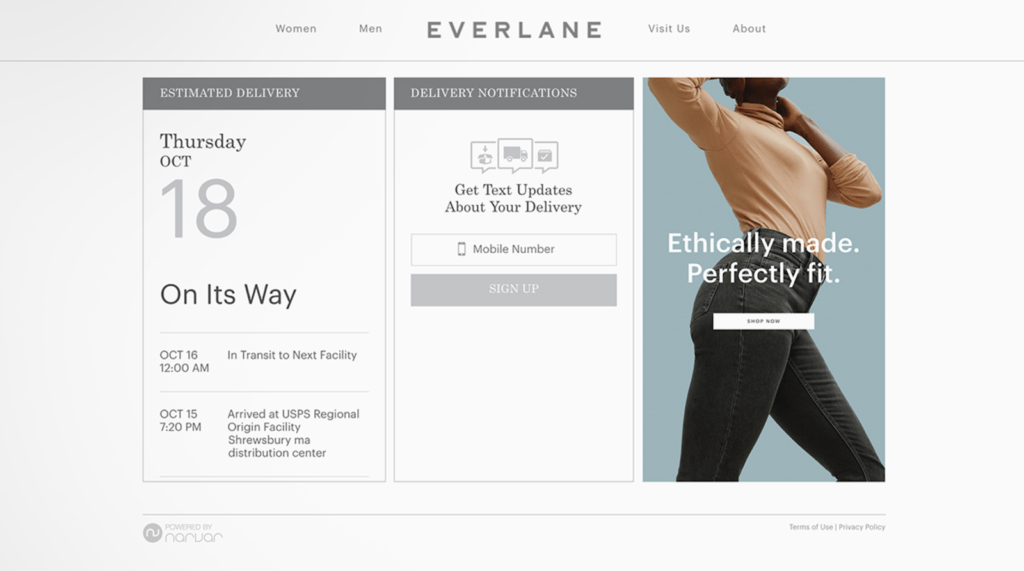
Build a customer- and growth-focused eCommerce email strategy to attract, retain, and satisfy customers by relying on accessible eCommerce tools.
In addition to causing dozens of other disruptions, the pandemic drastically changed the way most consumers shop. In particular, people turned to online shopping for additional convenience and of course, to avoid crowds.
Even though eCommerce marketing sales had steadily increased for years, they massively spiked in the spring in 2020. Even so, online retailers may need to improve their marketing tactics in order to keep growing because of changes in the overall market.
As eCommerce Marketing Grows, So Will Online Competition
According to a report on global eCommerce published by Insider Intelligence, an incredible 150 million shoppers made purchases online for the very first time during the course of the pandemic. Even now, shoppers are busy discovering new categories of items that they never considered buying over the internet before, like groceries, TV warranties, and furniture.
As more people get used to shopping online, growth may slow somewhat but the trend line will almost certainly remain pointed up. Still, any prudent eCommerce marketing agency would certainly advise clients to remain on top of their game because of increased competition.
Retail giants, traditional wholesalers, and eager startups have responded to the rise of eCommerce with additional investments in this space. For instance, a great email strategy can offer a competitive advantage against even the strongest competitors.
Why a Good eCommerce Marketing Agency Will Push an Email Strategy
An efficient email strategy provides eCommerce marketers with one of the best tools to beat competitors, big or small. Shopify, one of the best-known eCommerce platforms, published a list of reasons that their most successful partners develop an effective eCommerce email strategy:
- Keep connections with website visitors: Attracting customers to an online store requires a substantial investment, but they don’t always make a purchase the first time. Email can help close sales and even remedy cart abandonment. Shopify’s own data shows that the highest conversion rates came from email campaigns when compared with such other channels as direct, search, and social marketing.
- Develop customer relationships: Besides connecting with prospects, email helps develop relationships with customers. Online stores can let customers know about specials, sales, new products, and other promotions to attract them back for repeat purchases. As an example, in response to the recent RobinHood-Gamestop controversy, Acorns quickly sent out an email to let members know the difference between their investing strategy and RobinHood’s.
- Provide customer service and information: During the process of making a purchase, waiting for delivery, or requesting customer service, email serves as an efficient way to keep customers informed and to provide service. The right messages can build trust and even reduce the demand for live calls or chats with customer service reps.
Even more, Shopify mentioned a report that found 80 percent of companies relied upon email marketing as a primary channel both for acquisition of new customers and retention of loyal ones. They observed that email marketing occupied a unique place because it works well for attracting new audiences and retaining existing ones.
ECommerce Email Strategy Best Practices
Of course, not every business enjoys the same level of success with their email marketing strategies. Anybody with an email account probably gets dozens of marketing emails a day, and they probably don’t bother to open most of them and respond to even fewer. Just like eCommerce, email marketing remains a competitive business.
Even so, and believe it or not, some online businesses send out emails that their subscribers and customers actually look forward to receiving. That’s because these communications provide recipients with a good value, possibly in the form of specials, new products, information relevant to the customers, or of course, the status of orders. Businesses that want to develop a brand identity that helps entice customers to pay attention to their emails should consider these best practices.
1. Create strong subject lines
A previous on email subject lines article reported on a study that a typical email design agency expects returns of $38 for each $1 spent. If emails aren’t performing that well, begin by crafting better subject lines. Some highlights of these tips include personalizing subjects with the recipient’s name and adding humor, surprising facts, or even a challenge. Also, a limited offer that appeals to a consumer’s FOMO also generally proves effective.
2. Include an email signature
Even if an email design agency or writer crafted the email, it’s best to add an email signature line that includes contact information for somebody responsive within the company. Naturally, people will favor messages that look like they came from a person who can help them and is open to communication. To help with this, HubSpot has a free email signature generator that can produce a professional-looking signature.
3. Keep the main message above the fold
For internet marketing, above the fold means that readers don’t have to scroll to read the message. According to HubSpot, as few as 30 percent of readers will bother to scroll down. It’s fine and probably optimal to repeat the call to action later in the email, but make sure to include it early. Also, recipients will probably scan the greeting first, so businesses should also personalize that part of the email.
Examples of Online Retailers with a Great Email Marketing Strategy
Online retailers who want to use email marketing to help grow their business can benefit from the examples of some well-known brands.
Wayfair
If customers order a product, Wayfair will send followups to suggest complementary products. As an example, a customer could order a bed with a French Provincial headboard and frame. After the purchase, Wayfair might send out an email suggesting French Provincial dressers, nightstands, and other complementary bedroom furniture or accessories.

ProFlowers
ProFlowers provides an excellent example of emails that can help lure back potential customers with abandoned carts. Business Insider found that cart abandonment shouldn’t always translate to lost sales. Instead, it can give online retailers a great chance to get customers to respond to emails. In fact, they discovered that 40 percent of shoppers will open emails sent within three hours of leaving the cart. Even better, 20 percent will click through.
Of course, customers might not finish transactions for a variety of reasons. These could include price or some dissatisfaction with the exact product.
The ProFlowers approach includes:
- Maybe the shopper decided the product wasn’t exactly what they wanted, so the company tries to remedy this by showing that in addition to the abandoned product and a variety of similar ones.
- ProFlowers also uses emails to sweeten the offer by providing a 10-percent discount and a free vase if the customer completes an order.
Popular eCommerce Marketing Platforms
Good eCommerce marketing platforms help provide a level playing field for startups, small businesses, and even larger corporations. No business needs to design their own “Amazon” from scratch, which makes entry into online sales very accessible. From a DTC startup brand, to a small Main Street Mom & Pop, all kinds of brands have used these platforms to offer customers a good experience from the first day.
Shopify
Over a million businesses use the Shopify platform for retail sales. Visitors to Shopify.com might notice that the very first thing this company does is ask for an email to begin a free trial. If nothing else, that should demonstrate that Shopify understands the importance of building email subscriber lists for online business.
With modest pricing, customizable store themes, and plenty of add-ons and integration with other services, Shopify can provide the best online selling and growth solution for all sorts of eCommerce businesses.
Shopify has also introduced its own email marketing platform that integrates with paid store plans. According to their help system, Shopify provides up to 2,500 emails a month with any paid plan and charges a modest fee for overages. As an example, 1,000 extra emails would cost $1.
Klaviyo
Among other features, Klaviyo can introduce automation to email campaigns. Jordan Schau, the CEO of Pure Fix Cycles, offered a good illustration of benefits in his testimonial for this service. He said, for example, his company can sell a bicycle to a customer, and one week later, the platform might email that customer to offer them a useful bike accessory, like a lock.
The Klaviyo and Shopify integration allow stores to collect visitor information and send personalized messages. Personalized automation triggers can include dates, specific events, or membership in certain segments. It’s also great for running A/B tests.
Narvar
Narvar provides a way to enhance customer service and the overall customer experience after purchases. As an example, they provide a turnkey Shopify solution that manages shipping, tracking, notifications, and returns. In particular, the ability to send proactive communication to customers helps build trust, reduce concerns, and increase the chance of repeat business.

Design an Email eCommerce Strategy to Ensure Growth
Shopping online has spiked during the past year and will certainly continue to grow, though perhaps, not at the same rate. Even so, the very rise in eCommerce has attracted plenty of competition, from innovative startups to deep-pockets legacy enterprises. To thrive and grow, successful businesses need to maximize the benefits of efficient marketing channels, like email.
In addition, business face more restrictions about the way they buy or track people via search and social media because of regulations or sensitivities about privacy. According to Plytix, that alone should encourage eCommerce businesses to focus upon the efficiencies and valuable, first-party user data they can benefit from with email marketing.
Here’s the good news. Plenty of accessible platforms already exist that can ensure even startups and small businesses have access to the same smart technology that powers their largest rivals. For many companies, developing a strategy to use these tools to attract, retain, and satisfy customer may not take that much of an investment. An experienced eCommerce marketing agency can provide the insights and tactics almost any business needs to do more with email.



